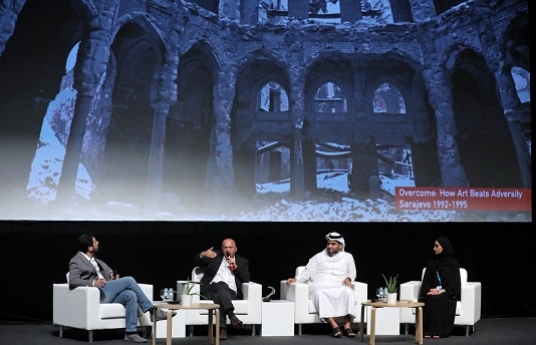الجلسة الحوارية الثانية من منبر أجيال ركزت على كيفية التغلب على الشدائد في اوقات الأزمات وأهمية الفن في تجاوز المصاعب
03 ديسمبر 2017

الدوحة قطر؛ 3 ديسمبر 2017: بحثت الجلسة الحوارية الثانية من منبر أجيال، الذي يقام ضمن فعاليات مهرجان أجيال السينمائي الخامس من تقديم مؤسسة الدوحة للأفلام، كيفية الاستفادة من أوقات الأزمات لتعزيز الحركة الاجتماعية والفنية وتقديم أعمال إبداعية مميزة.
وشارك في الجلسة كل من شوق شاهين المتخصصة في الصحافة المرئية والسمعية، والفنان عبد العزيز يوسف المؤسس المشارك لـ “كارتون“، وميرساد بوريفاترا مدير مهرحان سراييفو السينمائي، وأدار الجلسة معيد أحمد. وشارك المتحدثون خبراتهم وآراءهم في الندوة التي أقيمت بعنوان “تجاوز: كيف يتغلب الفن على الشدائد”.
وبدأت الجلسة بعرض فيلم قصير أظهر استجابة القطريين والمقيمين لأخبار الحصار على قطر وكذلك الاستجابة العفوية للمجتمع الإبداعي من فنانين وكتاب وموسيقيين وصناع أفلام اذين قدموا العديد من الإنتاجات والأعمال الفنية الرقمية. ويشار إلى أن هذه الأعمال تعرض حالياً في معرض “لبلوكيد” في المبنى 19 في كتارا ضمن فعاليات مهرجان أجيال السينمائي.
يضم معرض الحصار “لبلوكيد” أعمال المواطنين والمقيمين التي أنتجت مباشرة بعد فرض الحصار الجائر على قطر. وتظهر الأعمال الرغبة المشتركة للفنانين في الدفاع عن بلدهم لتعزيز مكانتها وتصحيح الصور الزائفة عنها في ظل الشائعات الأخيرة التي رافقت الحصار.
وقال أحمد معيد مدير الجلسة أن “القوة الناعمة للفن وقدرته على تغيير المفاهيم في قطر والعالم، وأن الفن ولد من جديد في قطر بسبب هذا الحصار”.
وقالت شوق شاهين معلقة على ردة فعلها على الحصار: “اكتشفت العديد من الأعمال الفنية الجديدة نتيجة هذا الحصار. لننظر إلى الجانب الإيجابي. لقد ساهم الحصار في إحياء الفن وتوحيد الناس معاً. والدليل على ذلك بأننا هنا الليلة.”
وتطرق عبد العزيز يوسف إلى تجربته في رسم رسوم كاريكاتيرية عندما عرف عن الحصار. ويقول “في العادة أرسم كاريكاتيراً واحداً في اليوم الواحد. في ذلك اليوم رسمت 30 لوحة. أنا أعي تماماً بأنه لدي قصة لأخبرها”. وأشار إلى أن الحصار الظالم ولّد فيه طاقة وقوة للعمل بجدّ وسرعة. “كنت معتاداً أن أنجز فيلماً تحريكياً من 30 ثانية كل أسبوعين أو ثلاثة. الآن أنجز العمل في خلال ساعتين فقط”.
بدوره أوضح ميرساد بوريفاترا الذي عاش الحصار لمدة 4 أعوام في سراييفو في فترة التسعينات بأن الطريقة التي يتحدث عنها الناس في قطر حول الحصار وردة فعلهم على ذلك، خصوصاً المجتمع الإبداعي، ذكره بما فعله جيله خلال الحرب في البوسنة.
وقال متحدثاُ عن تلك التجرية :“عندما قصفت المكتبة الوطنية في سراييفو، أدرك الكتاب والفنانون والممثلون والمخرجون بأن عليهم التوحد والقيام بأمر ما. وبدأ الأمر بعروض في المركز الثقافي الذي تعرض للدمار ومنح السكان بارقة أمل توّجت في عام 1995 بإطلاق مهرجان سراييفو السينمائي وسط الحصار. وبعد 23 عاماً أصبح المهرجان أكبر مهرجان سينمائي في أوروبا والمجموعة التي أطلقته لا تزال تعمل معاً في تعاون تام. أردنا أن نخبر العالم بأنه حتى من دون كهرباء وماء وطعام يمكن أن تواجه سراييفو الحصار بكل كرامة”.
وقد لاقت الجلسة إعجاب الحاضرين والجمهور الذي أجرى حواراً مثمراً مع المتحدثين.
تباع التذاكر للدورة الخامسة من المهرجان بسعر 25 ريالاً للتذكرة الواحدة للعروض العامة. تتوفر التذاكر على مدار الساعة عبر الموقع الإلكتروني ajyalfilm.comأو في شباك التذاكر الرئيسي لمهرجان أجيال في كتارا في المبنى 12 أو من شباك التذاكر لمهرجان أجيال في متجر فناك في الدوحة فستيفال سيتي.
ويحظى مهرجان أجيال السينمائي 2017 في نسخته الخامسة بالعديد من الشركاء هم: الحي الثقافي كتارا بصفة الشريك الرسمي، أوكسيدنتال للبترول و Ooredoo بصفة الشريك الرئيسي، والهيئة العامة للسياحة بصفة الشريك الاستراتيجي. لمزيد من المعلومات والاطلاع على آخر أخبار المهرجان، الرجاء زيارة الموقع الإلكتروني